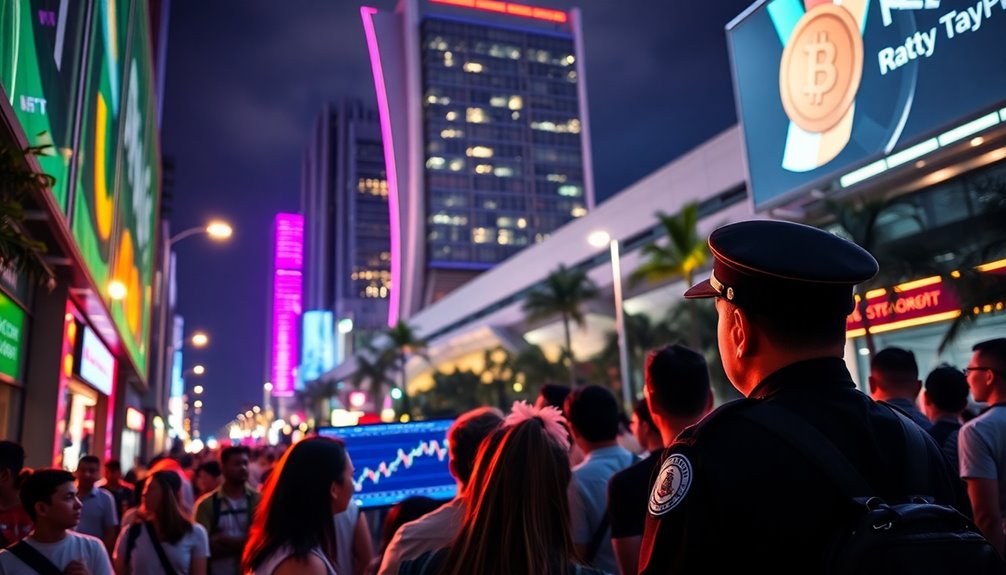Singapore's authorities have shut down the crypto prediction platform Polymarket for failing to comply with local regulations. The Monetary Authority of Singapore (MAS) strictly enforces licensing under the Payment Services Act, and it classified Polymarket as a gambling site, increasing the legal risks for users. Engaging with unlicensed platforms can lead to hefty fines or even jail time. This action underscores the seriousness of compliance in the crypto space. If you're curious about the specific regulatory measures and how they affect users, there's more to discover about Singapore's evolving cryptocurrency landscape.
Key Takeaways
- Singapore's Monetary Authority of Singapore (MAS) regulates cryptocurrency platforms under the Payment Services Act (PSA), enforcing strict compliance measures.
- Polymarket was classified as a gambling site by the Gambling Regulatory Authority (GRA), leading to its shutdown.
- Users accessing unlicensed platforms like Polymarket face severe penalties, including fines and imprisonment.
- The regulatory landscape in Singapore distinguishes between gambling and legitimate trading, complicating compliance for prediction markets.
- MAS plans to enhance regulatory frameworks to ensure consumer protection and mitigate risks associated with cryptocurrency services.
Regulatory Actions Overview

As Singapore tightens its grip on the cryptocurrency landscape, the regulatory framework is primarily enforced by the Monetary Authority of Singapore (MAS).
This framework includes the Payment Services Act (PSA), which sets licensing requirements for digital payment token services. If you're a business in this space, you'll need a license, with exemptions for non-monetary loyalty points. Singapore aims to enhance its status as a cryptocurrency hub in 2024, which further emphasizes the importance of compliance with regulations.
The Securities and Futures Commission (SFC) regulates specific digital tokens as securities, while the Gambling Regulatory Authority oversees crypto betting platforms.
The MAS also enforces strict compliance measures to combat money laundering and terrorism financing.
Recent actions, like banning Polymarket for unlicensed operations, highlight the seriousness of these regulations and the need for users to engage only with compliant platforms.
Legal Implications for Users

While accessing unlicensed crypto prediction platforms might seem tempting, users in Singapore face serious legal implications. You could face fines of up to SGD 10,000 or even six months in prison for using platforms like Polymarket. Additionally, the Gambling Regulatory Authority (GRA) has classified Polymarket as a gambling site, which reinforces the legal risks associated with its use.
In some cases, the penalties may combine both, and repeat offenders could see fines soar to SGD 700,000 with imprisonment extending up to 10 years. Authorities have taken steps to block access to such sites, displaying warnings about illegal gambling when you try to enter.
Classification Debate on Prediction Markets

The classification of prediction markets sparks considerable debate, particularly regarding their designation as gambling platforms or legitimate trading venues.
You see, these markets allow participants to trade contracts linked to future events, and they can forecast a wide range of outcomes—from elections to sports.
While some argue they're akin to gambling, proponents highlight their efficiency in aggregating information, often yielding more accurate forecasts than traditional methods. Moreover, lower statistical errors in prediction markets compared to professional forecasters can bolster their legitimacy as effective tools for economic forecasting.
However, legal classifications vary by jurisdiction, complicating regulatory compliance.
Cryptocurrency-based platforms face additional scrutiny, often categorized as gambling, which can hinder their operations.
This ongoing debate raises questions about the future of prediction markets and their potential role in economic forecasting.
Singapore's Regulatory Framework

Singapore's regulatory framework for cryptocurrencies is robust and multifaceted, encompassing several key laws and regulatory bodies.
The Payment Services Act (PSA) serves as the primary legal structure, governing digital payment tokens (DPTs) and imposing strict anti-money laundering (AML) and counter-terrorist financing (CFT) measures.
The Monetary Authority of Singapore (MAS) oversees DPT service providers, issuing licenses based on transaction volume and activity type.
Additionally, the Securities and Futures Act (SFA) regulates DPTs that resemble securities, ensuring compliance with established financial principles.
Singapore's rigorous enforcement of these rules reflects its commitment to a secure crypto environment while fostering innovation, making it a leader in the global cryptocurrency landscape. Furthermore, the regulatory control over Virtual Asset Service Providers (VASPs) highlights the government's proactive approach to overseeing the evolving cryptocurrency market.
MAS Initiatives and Future Outlook

With a solid regulatory framework already in place, the Monetary Authority of Singapore (MAS) is taking further steps to enhance its approach to cryptocurrency regulation. They plan to introduce strict licensing criteria for cryptoasset firms serving international clients. A recent consultation paper outlines updates for digital token service providers (DTSPs), emphasizing compliance with anti-money laundering and countering financing of terrorism rules. Additionally, MAS mandates the segregation of customer assets and requires the majority to be stored in cold wallets. This aligns with the new digital asset custody regulations, which ensure that customer assets are protected and managed securely. Enhanced consumer protection measures will discourage speculative activities, while a framework for stablecoins is in development. Lastly, DTSPs must establish robust cybersecurity systems and conduct due diligence on counterparties to mitigate risks. Moreover, these regulations will help to prevent potential market manipulation, similar to crypto pump schemes, which can harm investors.
Frequently Asked Questions
What Is Polymarket's Main Function in the Crypto Space?
Polymarket's main function in the crypto space is to serve as a decentralized prediction market where you can bet on real-world events.
You buy shares that represent the likelihood of outcomes, using USDC for transactions.
The platform operates on the Polygon network, ensuring transparency and security through blockchain technology.
With its unique mechanics, you engage in trading based on supply and demand, making predictions on everything from politics to sports.
How Can Users Access Legal Gambling Options in Singapore?
To access legal gambling options in Singapore, you've got a few choices.
You can visit integrated resort casinos like Marina Bay Sands or Resorts World Sentosa, but remember to pay the entry levy.
Alternatively, you can try your luck with Singapore Pools for lottery and sports betting or place bets on horse racing through the Singapore Turf Club.
If you prefer social gambling, ensure it's among family or friends at home.
Are There Alternatives to Polymarket for Predictions?
Looking for alternatives to Polymarket for predictions? You've got several exciting options.
Platforms like Projection Finance offer data-driven insights and simulate price variations, while Wingman predicts flight delays using real-time data.
DexWin provides an immersive betting experience across various sports.
Other noteworthy mentions include CryptoPredictions and DigitalCoinPrice, which forecast cryptocurrency trends.
Each platform brings its unique features, ensuring you can find one that suits your prediction needs!
How Does Polymarket Affect the Cryptocurrency Market?
Polymarket significantly influences the cryptocurrency market by driving engagement and promoting decentralized finance concepts.
As you participate, you contribute to increased trading volume, attracting more users to the crypto space. The platform's reliance on blockchain technology enhances transparency, fostering trust among traders.
Additionally, its community-driven approach creates a vibrant ecosystem, encouraging discussions and insights, which can lead to informed trading decisions and ultimately shape market trends and dynamics.
What Can Users Do if They Receive Penalties?
If you receive penalties for using an unlicensed platform, your best bet is to seek legal advice immediately.
Understanding your rights and options can help you navigate the situation. You might consider negotiating with authorities, paying fines promptly, or attending any required hearings.
It's crucial to comply with regulations moving forward, so ensure you only use authorized operators to avoid future legal troubles.
Stay informed about local gambling laws to protect yourself.
Conclusion
In shutting down Polymarket, Singapore's regulators are drawing clear lines in the sand about the future of prediction markets. While this move might feel like a storm cloud hanging over crypto enthusiasts, it also signals a push for clearer, more responsible practices in the industry. As the landscape evolves, you'll want to stay informed and adapt to these changes, ensuring you're navigating the waters of crypto safely and effectively. The tide is turning, and it's time to adjust your sails.









